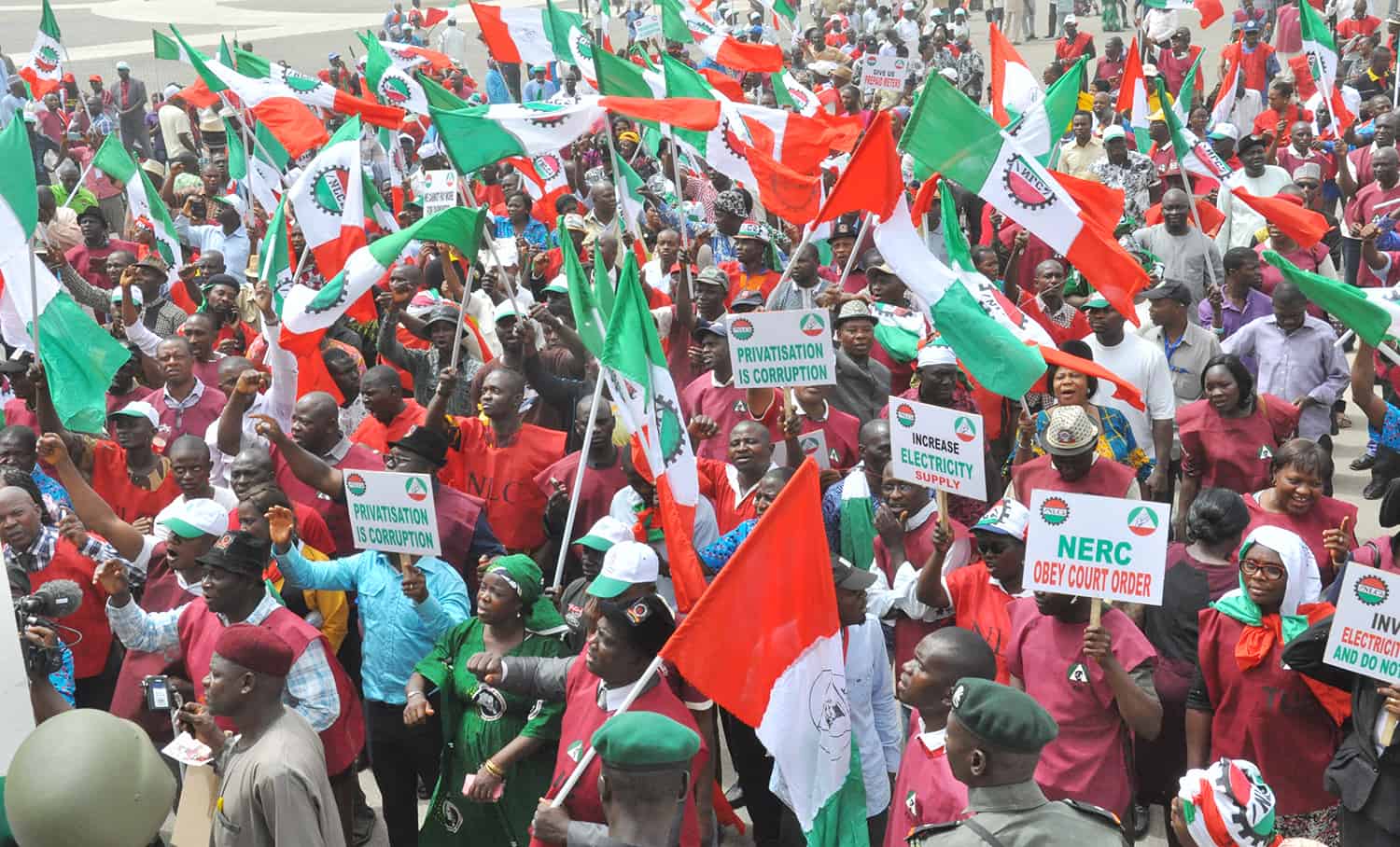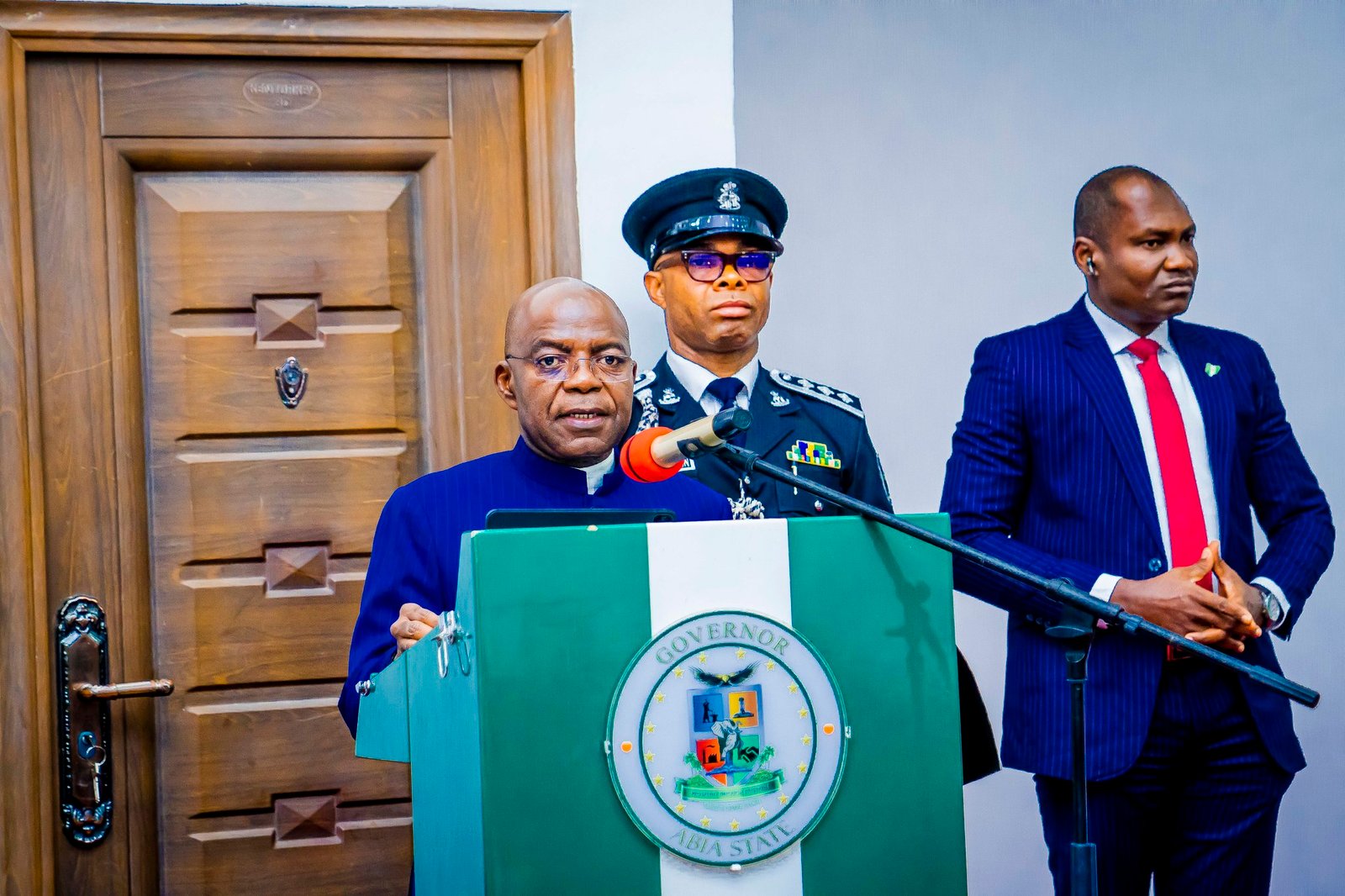Members of the Nigeria Labour Congress (NLC), Trade Union Congress (TUC) and the United Labour Congress (ULC) on Tuesday 30 October, staged a pre-scheduled one day warning strike to protest and mobilize support against delay in commencing the new national minimum wage.
New minimum wage, mandated by the constitution to be reviewed every 5 years was last reviewed to N18,000 per month in 2011 during the administration of former President Goodluck Jonathan.
The labour union workers were supported at the protest by several civil society allies including Joint Action Forum (JAF). Similar protests were held in several other States of Nigeria, Tuesday. At Lagos the protesters converged as early as 7:30 am in the morning at the usual Gani Fawehinmi Freedom Park at Ojota where their leaders – Mr Joe Ajaero, president of ULC, Amechi Asugwuni, NLC Deputy President and Abiodun Aremu of JAF addressed them.
Police kept a watchful eyes as the event unfolded.
Labour is bracing for a major showdown with government by embarking on an “indefinite strike” all over the country from the 6 November 2018 until its conditions are met. It accused government of reneging on a previous tripartite agreement that pegged the new minimum wage at N30,000 reached on 3 October. The tripartite committee was made up of representatives of the labour unions, federal and State government representatives and organized private sector.

Labour initially came to the negotiating table with a demand for N66,500 but had reconsidered to N30,000 as governments, particularly at the sub-national, bemoaned trite fiscal circumstances and their incapacity to pay. The governors, Labour claims, made a u-turn after the agreement, to announce a new offer of minimum wage of N22,500.00. Federal government proposed N24,000.
At a press conference called hurriedly after the governors’ position was announced, an infuriated Ayuba Wabba, NLC president flatly rejected the offer. He claims that wages must be arrived at from a process of negotiation and cannot be treated as “allocation” or “award” unilaterally by one party contrary to the rules of engagement and international labour conventions.
Back to the Lagos protests at the Freedom park, addressing the mammoth crowed of union members, TUC’s Mr. Ajero threatened, “Once we commence the strike, there is no going back except government agrees to our terms and conditions. The minimum wage is a legitimate right of the Nigerian workers.
“We are on the road to tell the government that enough is enough.
“The November 6 will be the mother of all strikes in Nigeria. Posterity will judge us if we fail to rise up to defend Nigerian workers. There is no good healthcare and electricity tariff is far more than N18,000 minimum wage and the tariff continue to increase”.
As the labour deadline approaches, State and federal governments are scrambling to avert the looming crises and its potential setback to an already fragile economy feared to be heading back to recession. Political leaders, mindful of a general election less than four months away are wary of the political costs of looking labour-unfriendly as election draws near. The vice president, Yemi Osinbajo, convened an emergency meeting with the ministers of finance, labour and productivity, and budget late afternoon of Wednesday 31 October. He earlier had similar closed door meeting Tuesday 30 October with the State governors.

Furthermore, the federal government has also announced the reconvening of the tripartite committee for Thursday 1 November for further deliberations.
Meanwhile, the ranks of the governor’s forum may be breaking. Bayelsa State Government has agreed to the workers’ demand for N30,000 as the new minimum wage. Wellington Obiri, Head of Civil Service, Bayelsa State made the promise when the leaders of the State’s Nigeria Labour Congress (NLC) and the Trade Union Congress (TUC) led a peaceful protest to the Government House, Yenagoa, on Tuesday.
Addressing the workers, he said: “I want to assure Bayelsa workers that government is in support of your quest for minimum wage. The N30,000 minimum wage will be implemented by the state government.”
The moral imperatives of the workers request is strong, gauging by public opinion. Inflationary pressure and devaluation of Nigeria’s currency, Naira, in the last 7 years has diminished significantly the purchasing power of workers salaries helping to push many into poverty. Analysts express confidence that with a more prudent fiscal management of State resources, cutting down on wastes, fighting corruption and driving up innovation in the management of the macro economy, all tiers of government should be able to meet its primary duty to its workforce – timely payment of a living wage for their employees.












